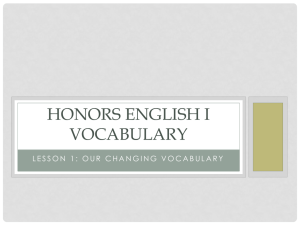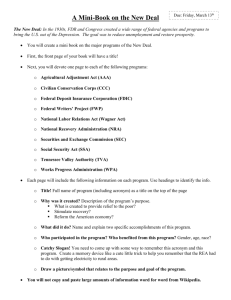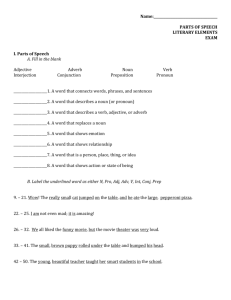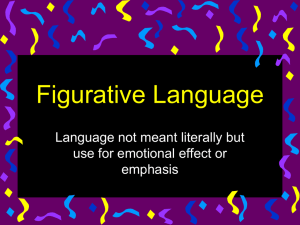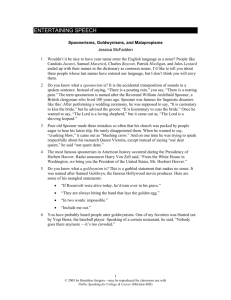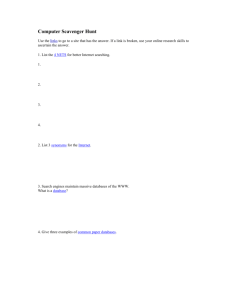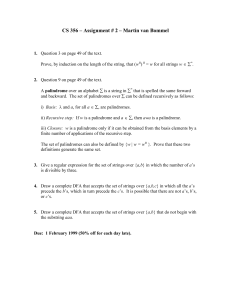Vocabulary 1
advertisement
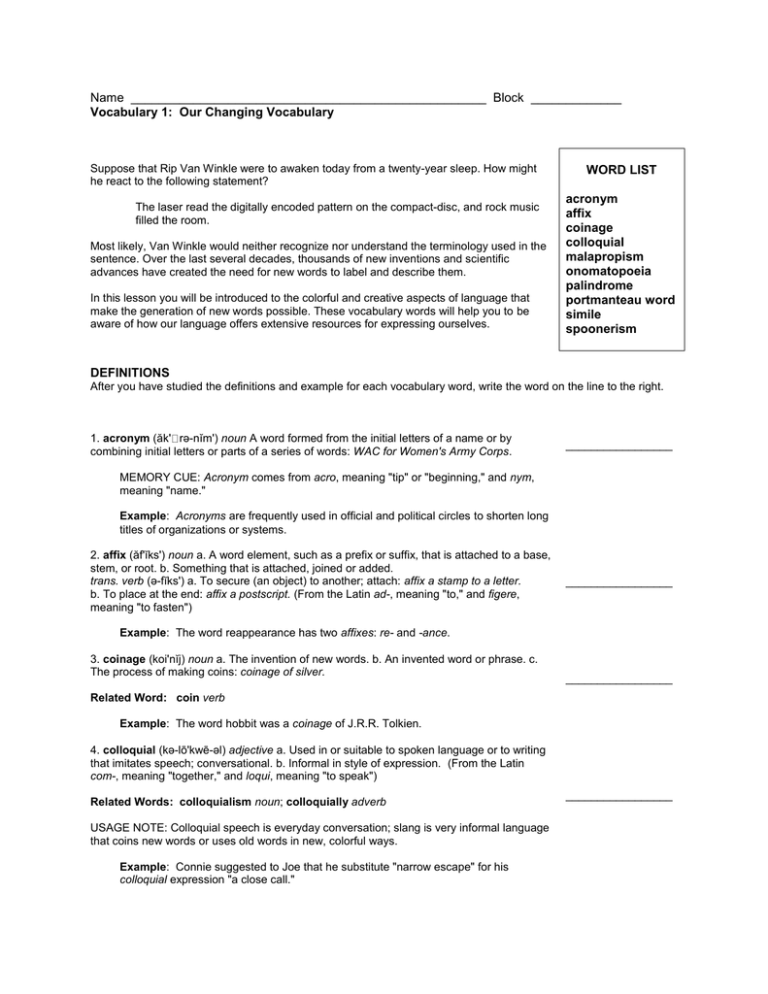
Name ___________________________________________________ Block _____________ Vocabulary 1: Our Changing Vocabulary Suppose that Rip Van Winkle were to awaken today from a twenty-year sleep. How might he react to the following statement? The laser read the digitally encoded pattern on the compact-disc, and rock music filled the room. Most likely, Van Winkle would neither recognize nor understand the terminology used in the sentence. Over the last several decades, thousands of new inventions and scientific advances have created the need for new words to label and describe them. In this lesson you will be introduced to the colorful and creative aspects of language that make the generation of new words possible. These vocabulary words will help you to be aware of how our language offers extensive resources for expressing ourselves. WORD LIST acronym affix coinage colloquial malapropism onomatopoeia palindrome portmanteau word simile spoonerism DEFINITIONS After you have studied the definitions and example for each vocabulary word, write the word on the line to the right. 1. acronym (ăk' rə-nĭm') noun A word formed from the initial letters of a name or by combining initial letters or parts of a series of words: WAC for Women's Army Corps. _________________ MEMORY CUE: Acronym comes from acro, meaning "tip" or "beginning," and nym, meaning "name." Example: Acronyms are frequently used in official and political circles to shorten long titles of organizations or systems. 2. affix (ăf'ĭks') noun a. A word element, such as a prefix or suffix, that is attached to a base, stem, or root. b. Something that is attached, joined or added. trans. verb (ə-fĭks') a. To secure (an object) to another; attach: affix a stamp to a letter. b. To place at the end: affix a postscript. (From the Latin ad-, meaning "to," and figere, meaning "to fasten") _________________ Example: The word reappearance has two affixes: re- and -ance. 3. coinage (koi'nĭj) noun a. The invention of new words. b. An invented word or phrase. c. The process of making coins: coinage of silver. _________________ Related Word: coin verb Example: The word hobbit was a coinage of J.R.R. Tolkien. 4. colloquial (kə-lō'kwē-əl) adjective a. Used in or suitable to spoken language or to writing that imitates speech; conversational. b. Informal in style of expression. (From the Latin com-, meaning "together," and loqui, meaning "to speak") Related Words: colloquialism noun; colloquially adverb USAGE NOTE: Colloquial speech is everyday conversation; slang is very informal language that coins new words or uses old words in new, colorful ways. Example: Connie suggested to Joe that he substitute "narrow escape" for his colloquial expression "a close call." _________________ 5. malapropism (măl'ə-prŏp-ĭz' əm) noun The use of a word sounding somewhat like the one intended but humorously wrong in the context: "polo bear" rather than "polar bear." (From the French phrase mal à propos, meaning "unsuitable") _________________ Example: In Sheridan's eighteenth-century play, The Rivals, Mrs. Malaprop makes such malapropisms as "the very pineapple of politeness" foR "the very pinnacle of politeness." 6. onomatopoeia (ŏn'ə-măt'ə-pē'ə) noun The formation or use of a word that imitates or resembles what it stands for. (From the Greek words onoma, meaning "name," and poiein, meaning "to make") _________________ Related Word: onomatopoetic adjective Example: Buzz and hiss are examples of onomatopoeia that the poet used to make the meadow come alive. 7. palindrome (păl'ĭn-drōm') noun A word, phrase, or sentence that reads the same backward or forward. (From the Greek words palin, meaning "again," and dromos, meaning "a running") _________________ Example: "A man, a plan, a canal, Panama" was the only palindrome that Richard could remember. 8. portmanteau word (pôrt-măn'tō, pôrt'măn- tō' wûrd) compound noun A word formed by merging the sounds and meanings of two different words; blend. _________________ Example: Arlin didn't realize that the word slithy in Lewis Carroll's poem "Jabberwocky" is a portmanteau word formed from slimy and lithe. 9. simile (sĭm'ə-lē) noun A figure of speech in which two essentially unlike things are compared, often in a phrase introduced by like or as. (From the Latin word similis, meaning "like") _________________ USAGE NOTE: Figures of speech with comparisons that omit "like" or “as” are called metaphors. Examples are "the song soared" and "The team crushed its opponent.” Example: Some similes, such as "hungry as a bear" and "sly like a fox," are considered to be overused. l0. spoonerism (spō̅̅̅̅̅̅ō̅̅̅'nə-rĭz'əm) noun An accidental but humorous distortion of words in a phrase formed by interchanging the initial sounds: "the tons of soil" rather than "the sons of toil." Example: The word spoonerism comes from the name of William A. Spooner, an English clergyman who was noted for such verbal slips. _________________ Exercise 1: Completing Definitions On the answer line, write the word from the vocabulary list that best completes each definition. ____________________1. A humorous misuse of a word sounding like the one intended is a(n) ______. ____________________2. A figure of speech in which two unlike things are compared is a(n) ______. ____________________3. Informal speech is known as ______ language. ____________________4. A(n) ______ is a word or sentence that reads the same backward or forward. ____________________5. A word or name formed by combining the first letters of words in a series is a(n) ______. ____________________6. An interchange of the initial sounds of two or more words is a(n) ______. ____________________7.______ is the invention of new words. ____________________8. A word part, such as a prefix or suffix, that is attached to a base or root is a(n) ______. ____________________9. ______ is the use of a word that imitates what it stands for. ____________________10. A word formed by merging the sounds and meanings of two words is a(n) ______. Exercise 2: Using Words Correctly Each of the following questions contains an italicized vocabulary word. Choose the correct answer to the question, and write Yes or No on the answer line. ________1. If you speak too quickly, might you utter a spoonerism? ________2. Would you use colloquial language in a formal essay? ________3. Would you use onomatopoeia to express the sound of a pebble dropping into a lake? ________4. If you formed a word from the first letters of words in a group, would you be adding an affix? ________5. Is the word splatter a portmanteau word formed from the combination of splash and spatter? ________6. Would you be guilty of a malapropism if you said that you went out with your friends for piazza rather than pizza? ________7. Is the invention of new words described as the acronym of new words? ________8. Would a word such as claptrap be considered a palindrome? ________9. Is the coinage of a word a deliberate misuse of a word? ________10. Is a simile the comparison of two unlike things? Exercise 3: Choosing the Best Word Decide which vocabulary word or related form best completes the sentence, and write the letter of your choice on the answer line. ________1. Swish, ping, and zoom are examples of______? a. palindromes b. onomatopoeia c. affixes d. acronyms ________2. When Laurie said that the sea gulls were consecrating, instead of congregating, around the lobster boat, everyone laughed at her______. a. colloquialism b. acronym c. malapropism d. simile ________3. ASAP is a(n) ______ formed from the phrase as soon as possible. a. malapropism b. spoonerism c. palindrome d. acronym ________4. Blurt, formed from the words blow and spurt, is a(n) ______ . a. palindrome b. acronym c. affix ________5. By adding a(n) ______ to the word, Jim changed its meaning. d. poitinanteau word a. affix b. acronym c. simile d. palindrome ________6. Danny used a(n) ______ when he described the music as being like dark velvet. a. acronym b. simile c. malapropism d. palindrome ________7. Aunt Eunice used______when she spoke of her relatives as "kith and kin." a. a colloquialism b. a palindrome c. a portmanteau word d. onomatopoeia ________8. No one caught Lila's______; she said "roaring pain" rather than "pouring rain." a. simile b. malapropism c. spoonerism d. acronym ________9. The question "Did Hannah say as Hannah did?" is an example of______. a. an acronym b. a palindrome c. onomatopoeia d. coinage ________10. The______of the word splashdown seemed necessary to describe the water landing of a missile or spacecraft. a. acronym b. colloquialism c. coinage d. palindrome Exercise 4: Using Different Forms of Words Decide which form of the vocabulary word in parentheses best completes the sentence. The form given may be correct. Write your answer on the answer line. ____________________1. Snafu is an______for the phrase "situation normal all fouled up." (acronym) ____________________2. Rachel wrote about the______effects of the words thump, crunch, and thud in the description. (onomatopoeia) ____________________3. The computer industry has been responsible for______many new words. (coinage) ____________________4. Greg's goal was to write several original______. (palindrome) ____________________5. Denise knew that memorizing the meanings of______was an excellent way to build her vocabulary. (affix) ____________________6. ______are labeled as such in the thesaurus. (colloquial) ____________________7. Joaquiri s favorite______is E.B. White's "Records fell like ripe apples on a windy day." (simile) ____________________8. The concert program had a______in it: the writer referred to the talent of the musical progeny rather than prodigy. (malapropism) ____________________9. Marty couldn't understand why the audience was giggling; he didn't realize that his______"well-boiled icicle" had replaced "well-oiled bicycle." (spoonerism) ____________________10. "Can anyone tell me what______comes from combining chuckle and snort?" asked Mrs. Davidson. (portmanteau word)
